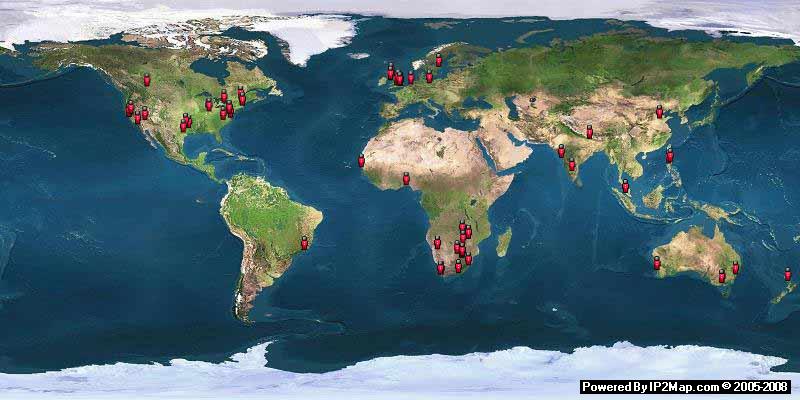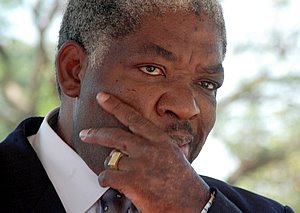Mathuthu misses the point
Working until 2 am last night, I was startled by a cellphone message which read; "See Mathuthu's column on newzim." I thought I will leave it till tomorrow, but I knew probably that would be the end of it. So I said, "I'll just skim through and go to sleep." I ended up staying till 5 am to give a quick response to one of the most disturbing articles I have ever read on the analysis of the situation in
There are many issues that Mathuthu wrote about which need immediate reaction. The article consisted of a mix of legal, personal and political issues that were either not clearly articulated or their synergies not properly identified.
For instance he says,
"Rallies are temporarily banned in
Mathuthu's assertion is that it is a fact that there was a law broken and that law was wilfully broken. He asserts that the police can take people down to fulfill the will of parliament. These are very disturbing statements, not only because of the implication that police are only there to take people down, but because of the inaccurate legal reasoning behind them.
Mathuthu misses two major points pertaining to the role of the legal system and the Zimbabwe Republic Police (ZRP).
Firstly, the role of the ZRP is not necessarily to take people down, and even if it were so, on Sunday they did more than that, notwithstanding the fact that many of them were militia and soldiers from the Cranborne Barracks disguised in riot police regalia. Their role is to uphold the law fairly and pursue and bring to justice those who break the law.
When you join the ZRP you sign a pledge to protect, help and reassure the community. You also make a pledge to "do all things with integrity, common sense and sound judgement" [ZRP Employee Bulletin, 1998]. The activities of Sunday 11 March 2007 were far from protecting, helping and reassuring the community.
Secondly, the court system in
ZRP on Sunday 11 March 2007 played the role of the law-maker, the courts, and the law enforcer. They brutally murdered one person and seriously injured others by firing gunshots at them. They brutally assaulted and tortured many others; including top opposition leaders Tsvangirai and Mutambara. In a sense, it's the ZRP that broke the law and should be brought before the courts.
Defying bad laws
Mathuthu says he has considered the issue of defying bad laws, but does not expand further.
Mathuthu suggests that there is a law in
To the thesis that we are obliged to obey even unjust laws, I find this line of argumentation highly flawed.
The ban was issued under the Public Order and Security Act (POSA). Not only has the constitutional validity of this piece of legislation been questioned in all legal circles, lawmakers in
According to Dr. Martin Luther King Jr., “An unjust law is a code that a numerical or power majority compels a minority group to obey, but does not make binding on itself.” By its very legal nature, the three month ban does 'not make binding on itself'. As it was issued under POSA, the one month limit imposed by POSA should kick in, anything more than one month is unconstitutional and not law.
One very well known legal writer said, “If the law is to be effective – outside the anarchist’s utopia – there must be some machinery for detecting and penalizing lawbreakers. This machinery will cost something to maintain and operate, and the cost will have to be met by the community. If I break the law, the community will be put to the expense of enforcement.”
Using this definition to analyse Sunday's events, we run into serious moral and legal problems.
Firstly, there was no clear machinery to detect lawbreakers, or if it was there, it was not outside the anarchist's [Zanu PF's] utopia, rendering the regime anarchist. The law had not been broken yet, when the activists were arrested and tortured. The 'police' had barricaded entrances to the assembly points well before the start time of the prayer meetings.
So how will the activists have wilfully broken the law when they did not have a chance to even break it? Do you call this pre-emptive justice? Or maybe it's pre-emptive violence?
Secondly, the very community terrorised by the police is the community that funds that terror through taxes -- a moral consideration. How do you justify using using people's earnings to terrorise and butcher them?
I would, however, pose that the moral cost of obeying a law that one thinks is deplorable -- POSA/AIPPA -- is higher than the cost of enforcing that law.
I would remind you that mass genocide of non-Aryan races under Adolf Hitler was legal -- yes it was within the remit of the law. Would we chastise someone for disobeying that law? Would we chastise someone for disobeying POSA and AIPPA, and its offspring, the three month unconstitutional ban.
To maintain liberty, we are obliged to stand up when there is injustice.
Was it a political rally?
Mathuthu's argument is that the gathering was a political rally. He forgets that it never was. They did not have a chance to gather -- whether as a prayer group or political rally. The activists were not given that chance.
He also seems to base his legal evidence on some undisclosed MP who suggested that rallies were pointless. Why he decided to ask the unnamed MP has nothing to do with us, but I would have thought his question could have been about the legality or illegality of the gathering and the exact classification of the gathering -- whether it was a rally or a prayer group.
In any case you would only know by the behaviour of the crowd whether it was a rally or a prayer meeting. Zanu PF assumed it would be a rally. How just and how legal are the consequences of that assumption?
--'Tsvangirai’s failure to organise and strategise that has brought us to where we are'--
Mathuthu suggests or implies by this statement that Tsvangirai is the cause of
If he meant 'where
If by 'where we are' Mathuthu meant Sunday 11 March 2007 arrests, shootings, torture, hospitalisation, victimisation, he is still deluded to think Tsvangirai's failure to organise and strategise would have led us there. How do you organise in a political state of flux. Zanu PF itself is failing to organise and strategise.
Election rigging
--'The MDC’s major enemy in past and future elections is the failure of its supporters and sympathisers to register, and vote. It’s that simple really.'--
Statements like these are not only misleading, but are very dangerous. They fail to recognise the sophistication of the Zanu PF election rigging machinery and the power that's at Zanu PF's disposal. To Mathuthu I say, "It's NOT that simple really."
Zanu PF has little need for vote fraud because they control the election laws. They can pass, and indeed have passed, election laws that give themselves an unassailable legal advantage at the ballot. Mathuthu fails to realise that laws banning political rallies constitute and are tantamount to constitutional vote rigging. Rallies are important in informing people to make choices about political parties and political leaders.
To Mathuthu, I would say investigate the the specific provisions of the Urban Councils Act and how it should serve the local government structures. An analysis of this Act would reveal various anomalies within the act and in terms of how it is applied. I would not attempt to discuss them here.
Accessing electoral information in
Election rigging machinery is not as simplistic as you make it appear. It involves a lot of variables; viz, the law regarding access to information, registration of journalists, the functioning of electoral commission, the demarcation of election constituencies, the funding of political parties, the general standard of living of people. This is quite an intricate and invisible web of election-rigging machinery which the 'naked eye' will not decipher. So it is not true to say that, "The MDC’s major enemy in past and future elections is the failure of its supporters and sympathisers to register, and vote. It’s that simple really."
Mobilising people for future elections
--'Instead of preaching to the converted in rallies in Harare’s townships, and getting arrested, beaten up and God knows possibly poisoned, the MDC leaders could devise other subtle strategies to mobilise people for future elections'--
I do not see how Mathuthu expects Tsvangirai to 'mobilise people for future elections'. If the meaning of 'subtle' is taken literally, Mathuthu is suggesting that Tsvangirai should be more 'skillful, clever, or ingenious'.
The mind-boggling question is: How do you get 'skillful, clever and ingenious' when the political and terror machinery pre-empts your every move -- like what happened on Sunday? How do you 'devise subtle strategies' when the consequences are death, torture and imprisonment? Maybe Mathuthu would care to pair-up with the MDC president and suggest ingenious ways of tackling the Zimbabwean crisis, which Mugabe will find appetising.
--'A stealth operation run along the lines of census taking ... Printing political literature, ... local foot soldiers to do door-to-door voter education and political conscientisation in every corner of the country is a far better option that getting arrested and then beaten in Highfield – all for nought.'--
A stealth operation suggests a secretive, clandestine, or surreptitious operation that out-manouvres Zanu PF members, CIOs and other intelligence gathering individuals. It would be fallacious to think that the MDC could get together foot soldiers who would go door-to-door and politicise the grassroots.
The sheer scale and effort of that operation will guarantee failure at the first attempt. You will need food, water, drink, clothing for such an operation to take off and more resources to make it functional and sustainable. Where would these people stay or live? During the Chimurenga War, it was possible because guerilla movements were funded by the waring Cold War blocs and there were bases where you could safely house these people.
And how clandestine could that operation be? Remember there are staunch Zanu PF supporters in those areas too. Many of the MDC people will disappear or die before they have even compiled a single census report.
Zimbabweans are tired
Zimbabwean people are tired of the political bickering; they simply want to carry on with their lives and remain hopeful of a better future.
Their primary concerns are economic, not political. They worry most about high prices and unemployment.
Although I agree that the opposition sometimes "headless and scattered," I still commend them for their courage and commitment to soldier on despite the hopelessness of the current situation.
A nationwide outrage is still absent, and there has not been a spark large enough to trigger such outrage into a massive uprising. Still absent from among the anti-government forces is the involvement of significant elements of the armed forces and the
But while an uprising is not likely to happen, the spirit of defiance and activism must be perpetuated and institutionalised, as the country continues to face long-standing problems of poverty, corruption, injustice and inequity.
The transition to democracy in Zimbabwe is made difficult by an alliance between business and politics that allows wealthy and powerful families to use public authority for their own gain and also to create powerful oligarchies that will be difficult to destroy, but could pose a threat to the Mugabe regime; e.g. the Mujuru diamond interests, etc.
Mugabe, Mujuru, Munangagwa and other individuals have used the powers of the state to create opportunities for themselves to make money and more money—without having to create economic value for the common good. They make the transition to democracy difficult and often use state resources to thwart opposition activities, so as to protect their business interests.
Morgan will find it extremely difficult and frustrating to break these powerful 'oligarchs'.
Lastly....
I say to Mathuthu, at certain instances in your article, you seem critical for the sake of being critical. The solutions you provide are weak and impractical. The legal reasoning attempted at the beginning of your document is fallacious and therefore dangerous as a guarantor of democracy.
I believe that, while your argument has a little merit, it is an extremely oversimplified slippery slope.
I will leave you with a very important quote from Dr. Rev. Martin Luther King Jr., one of my heroes in the struggle for justice and peace.
King says: "I submit that an individual who breaks a law that conscience tells him is unjust and who willingly accepts the penalty of imprisonment in order to arouse the conscience of the community over its injustice, is in reality expressing the highest respect for the law."
Itayi Garande is the editor of TalkZimbabwe.com. He can be contacted at itayig@hotmail.com











No comments:
Post a Comment